Peugeot Rifter VS VW ID. Buzz Cargo – Specs, Efficiency & Price Comparison
Which model is the better choice – the Peugeot Rifter or the VW ID. Buzz Cargo? We compare performance (136 HP vs 340 HP), boot capacity (1050 L vs ), efficiency (19.10 kWh5.60 L vs 19.20 kWh), and of course, the price (23800 £ vs 43600 £).
Find out now which car fits your needs better!
The Peugeot Rifter (High Roof Estate) is powered by a Electric or Diesel engine and comes with a Automatic or Manuel transmission. In comparison, the VW ID. Buzz Cargo (Cargo Van) features a Electric engine and a Automatic gearbox.
When it comes to boot capacity, the Peugeot Rifter offers 1050 L, while the VW ID. Buzz Cargo provides – depending on what matters most to you. If you’re looking for more power, you’ll need to decide whether the 136 HP of the Peugeot Rifter or the 340 HP of the VW ID. Buzz Cargo suits your needs better.
There are also differences in efficiency: 19.10 kWh5.60 L vs 19.20 kWh. In terms of price, the Peugeot Rifter starts at 23800 £, while the VW ID. Buzz Cargo is available from 43600 £.
Compare all the key specs now and find out which model fits your lifestyle best!
Peugeot Rifter
Der Peugeot Rifter beeindruckt mit seinem robusten Design und seiner hohen Vielseitigkeit, die ihn ideal für Familien und Outdoor-Abenteuer macht. Der Innenraum ist geräumig gestaltet und bietet zahlreiche innovative Technologien, die den Komfort und die Sicherheit der Insassen erhöhen. Zudem überzeugt der Rifter mit seiner hervorragenden Fahrdynamik, die sowohl in der Stadt als auch auf längeren Strecken für ein angenehmes Fahrerlebnis sorgt.
details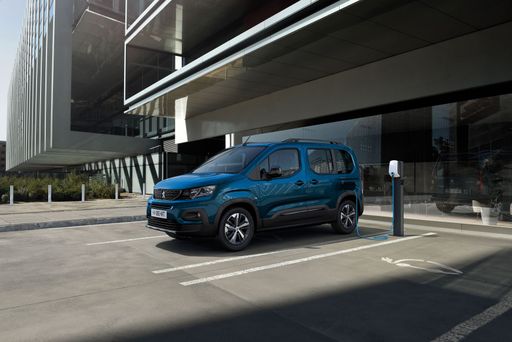 @ media.stellantis.com
@ media.stellantis.com
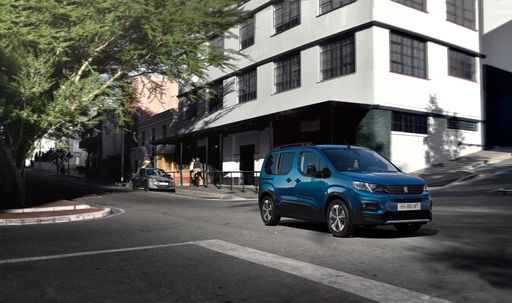 @ media.stellantis.com
@ media.stellantis.com
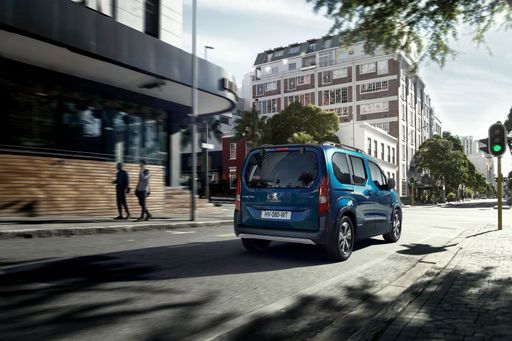 @ media.stellantis.com
@ media.stellantis.com
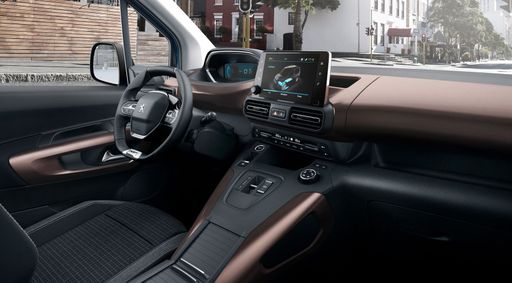 @ media.stellantis.com
@ media.stellantis.com
VW ID. Buzz Cargo
The VW ID. Buzz Transporter represents a bold leap into the future with its innovative electric design and retro-inspired aesthetic. Combining practicality with modern technology, it offers a spacious interior and advanced connectivity features ideal for both urban and long-distance journeys. This vehicle stands as a testament to Volkswagen's commitment to sustainability and forward-thinking mobility solutions.
details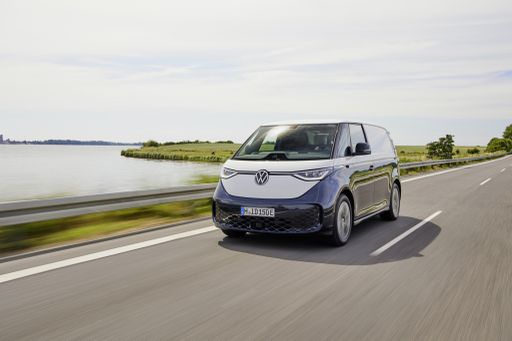 @ volkswagen-newsroom.com
@ volkswagen-newsroom.com
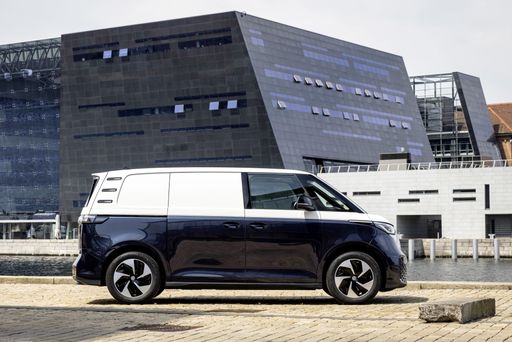 @ volkswagen-newsroom.com
@ volkswagen-newsroom.com
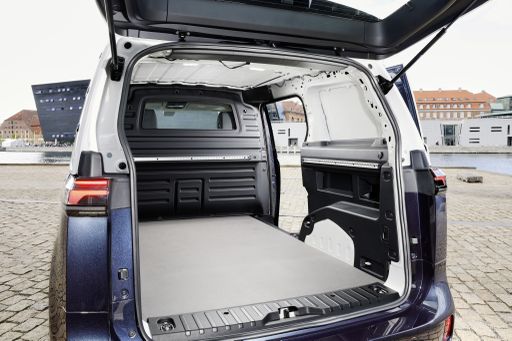 @ volkswagen-newsroom.com
@ volkswagen-newsroom.com

|

|
|
|
|
Costs and Consumption |
|
|---|---|
|
Price
23800 - 36300 £
|
Price
43600 - 51400 £
|
|
Consumption L/100km
5.6 - 6 L
|
Consumption L/100km
-
|
|
Consumption kWh/100km
19.1 - 19.2 kWh
|
Consumption kWh/100km
19.2 - 20.3 kWh
|
|
Electric Range
329 - 340 km
|
Electric Range
330 - 455 km
|
|
Battery Capacity
-
|
Battery Capacity
59 - 79 kWh
|
|
co2
0 - 158 g/km
|
co2
0 g/km
|
|
Fuel tank capacity
50 L
|
Fuel tank capacity
-
|
Dimensions and Body |
|
|---|---|
|
Body Type
High Roof Estate
|
Body Type
Cargo Van
|
|
Seats
5 - 7
|
Seats
3
|
|
Doors
4 - 5
|
Doors
4
|
|
Curb weight
1561 - 1941 kg
|
Curb weight
2264 - 2510 kg
|
|
Trunk capacity
322 - 1050 L
|
Trunk capacity
-
|
|
Length
4405 - 4755 mm
|
Length
4712 mm
|
|
Width
1848 mm
|
Width
1985 mm
|
|
Height
1818 - 1837 mm
|
Height
1932 mm
|
|
Payload
489 - 814 kg
|
Payload
640 - 753 kg
|
Engine and Performance |
|
|---|---|
|
Engine Type
Electric, Diesel
|
Engine Type
Electric
|
|
Transmission
Automatic, Manuel
|
Transmission
Automatic
|
|
Transmission Detail
Schaltgetriebe, Automatikgetriebe
|
Transmission Detail
-
|
|
Drive Type
Front-Wheel Drive
|
Drive Type
Rear-Wheel Drive, All-Wheel Drive
|
|
Power HP
102 - 136 HP
|
Power HP
170 - 340 HP
|
|
Acceleration 0-100km/h
10.8 - 13.6 s
|
Acceleration 0-100km/h
-
|
|
Max Speed
132 - 184 km/h
|
Max Speed
145 - 160 km/h
|
|
Torque
250 - 300 Nm
|
Torque
310 - 679 Nm
|
|
Number of Cylinders
4
|
Number of Cylinders
-
|
|
Power kW
75 - 100 kW
|
Power kW
125 - 250 kW
|
|
Engine capacity
1499 cm3
|
Engine capacity
-
|
General |
|
|---|---|
|
Model Year
2024
|
Model Year
2024
|
|
CO2 Efficiency Class
A, E, F
|
CO2 Efficiency Class
A
|
|
Brand
Peugeot
|
Brand
VW
|
Peugeot Rifter
Der perfekte Begleiter für jede Fahrt: Der Peugeot Rifter
Der Peugeot Rifter hat sich als vielseitiger Hochdach-Kombi auf dem Markt etabliert. Mit seinem anpassungsfähigen Innenraum und einer Vielzahl von Antriebsvarianten bietet der Rifter für viele Anforderungen die passende Lösung. Ob als Familienauto oder für den urbanen Lieferverkehr – der Rifter passt sich flexibel den jeweiligen Bedürfnissen an.
Innenraum und Komfort
Der Innenraum des Peugeot Rifter ist so konzipiert, dass er sowohl Komfort als auch Funktionalität bietet. Mit bis zu sieben Sitzen eignet sich das Fahrzeug perfekt für größere Familien oder Gruppen. Der variable Kofferraum bietet ein Fassungsvermögen von bis zu 1050 Litern, sodass auch größere Lasten problemlos transportiert werden können.
Technische Details und Motorvarianten
Der Peugeot Rifter ist mit einer Vielzahl von Antriebsarten verfügbar. Neben den sparsamen Benzin- und Dieselmotoren bietet Peugeot auch innovative Elektrovarianten an. Die Leistungsbandbreite reicht von 102 PS bis 136 PS, je nach gewähltem Modell und Motoroption.
Die Elektromodelle, unter dem Namen e-Rifter bekannt, bieten eine beeindruckende Reichweite von bis zu 340 km und sind somit bestens geeignet für den täglichen Pendelverkehr in städtischen Gebieten. Dank der verschiedenen Getriebetypen, von manuellen Getrieben bis hin zu achtstufigen Automatikgetrieben, findet jeder Fahrer das für ihn passende Fahrgefühl.
Innovationen und Sicherheit
Peugeot hat den Rifter mit einer Vielzahl von Sicherheits- und Assistenzsystemen ausgestattet. Dazu zählen unter anderem adaptive Geschwindigkeitsregelung, Spurhalteassistent und ein autonomer Notbremsassistent. Mit diesen Systemen sorgt der Rifter für ein hohes Maß an Sicherheit und Komfort auf der Straße.
Der umweltfreundlichere Weg
Besonders erwähnenswert ist die Effizienz seiner Elektrovarianten. Mit einem durchschnittlichen Verbrauch von 19,1 bis 19,2 kWh/100 km leistet der e-Rifter einen Beitrag zur umweltfreundlicheren Mobilität. Auch die CO2-Effizienzklasse der Diesel- und Benzinvarianten ist mit Werten von A bis E bemerkenswert.
Fazit: Ein Auto für alle Fälle
Der Peugeot Rifter ist mehr als nur ein Fahrzeug – er ist ein verlässlicher Partner für das tägliche Leben. Mit seinem geräumigen Innenraum, den flexiblen Antriebsoptionen und den fortschrittlichen Sicherheitsmerkmalen zeigt der Rifter, dass Stil und Funktionalität harmonisch vereint werden können. Egal ob auf der Autobahn oder in der Stadt: Der Rifter ist bereit, jede Herausforderung zu meistern.
VW ID. Buzz Cargo
Reimagining the Classic: The VW ID. Buzz Transporter
The automotive industry has recently been inundated with a range of electric vehicles (EVs), but few can claim a lineage as iconic as the Volkswagen ID. Buzz Cargo. A modern-day reimagining of the classic VW Microbus, the ID. Buzz Transporter seamlessly blends nostalgia with cutting-edge technology and sustainable performance.
Power Meets Precision: Performance and Efficiency
Available in multiple configurations, the ID. Buzz Transporter offers both rear-wheel drive and all-wheel drive options. The base model features an impressive 286 horsepower and a respectable electric range of 461 km, thanks to its 19.2 kWh consumption per 100 km. For those who crave more power, the all-wheel-drive model ups the ante with a thrilling 340 horsepower and a range of 432 km, facilitated by its slightly higher 20.3 kWh/100 km consumption.
Both versions rely on an efficient reduction gearbox, ensuring a smooth and automatic driving experience. The rear-wheel-drive's entry-level model provides a more accessible point for EV enthusiasts with 170 horsepower and an overall easier handling package.
The Heart of an Electric Revolution: Battery and Range
Power comes from robust battery configurations that reflect VW's commitment to sustainable performance. The ID. Buzz Transporter boasts a 79 kWh battery in its higher-end models, allowing expansive commutes or work-related travels. Meanwhile, the 59 kWh option offers a reduced footprint, without substantially compromising on performance, to align perfectly with its more entry-level 170 HP variant.
Functional Innovation: Design and Practicality
While the exterior design pays homage to its retro predecessor, the four-door ID. Buzz is all about embracing modern interior design. The cargo van accommodates up to three seats, making it not only a style statement but a practical choice for businesses needing a workhorse with a zero-emission output.
Weighing in at a curb weight range from 2264 kg to 2510 kg, depending on the model chosen, the vehicle is a testament to Volkswagen's focus on durability and reliability. Despite its weight, the ID. Buzz delivers a payload ranging from 640 kg to 753 kg, maintaining crucial cargo efficiency.
Sustainability Meets Technology: Features and Future Outlook
Volkswagen intentionally integrated forward-thinking technology into the ID. Buzz, emphasizing zero emissions with a CO2 rating of 0 g/km and maintaining an A-grade CO2 efficiency class. These advancements, paired with a maximum speed of 160 km/h and an impressive torque (ranging from 310 Nm to 679 Nm based on the selected variant), set a new standard for electric utility vehicles.
Conclusion: A Symbol of Tomorrow, Today
The ID. Buzz Transporter signifies VW's earnest step into the future while paying homage to its rich heritage. Priced between €50,825 and €59,922, the vehicle caters to a range of consumers looking for a versatile and eco-friendly solution without sacrificing quality or style. With its innovative engineering and nostalgic charm, the ID. Buzz Transporter is poised to capture the imagination of both traditional VW fans and new EV adopters in 2024.
The prices and data displayed are estimates based on German list prices and may vary by country. This information is not legally binding.
